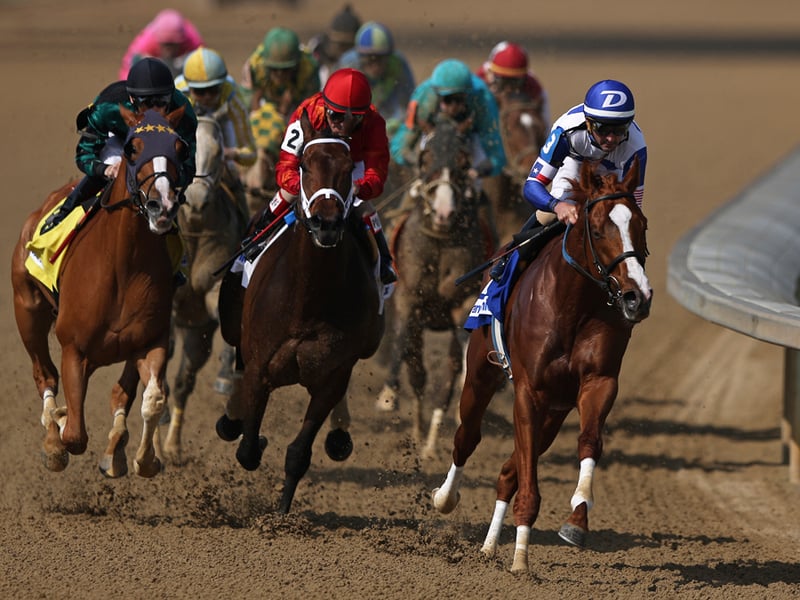American Pharoah's chance to attain the rare Triple Crown at New York's Belmont Stakes is likely to spark increased investment interest among those who've always dreamed of backing a winning thoroughbred.
Any time the hype around horse racing heats up, financial advisers receive more questions from wealthy clients who are passionate about all things equine. Most advisers are quick to tell them to think of horse racing as an expensive hobby, not a business venture.
The likelihood of investing in a horse that even makes it into a race after a year or two of expensive training, veterinary care, shoeing, feeding and other expenses are poor. The odds of the horse winning races are especially long.
“Don't expect you are going to make money, but you may get a great temporary ride,” said Austin Frye, principal of Frye Financial Center. He's seen the thrill-ride up close.
A client who had always loved horses purchased a few in the late 1980s, and to everyone's surprise, the client found himself at the Kentucky Derby in 1992 with a horse he paid about $20,000 for, Mr. Frye said.
Pistol and Roses came in a disappointing 16th place at the derby, but the client picked up $1.7 million in winnings from the gray colt over its lifetime and had a great story to tell for the rest of his life.
“It was the greatest thing to ever happen to him,” Mr. Frye said.
Even that client, who died in December, failed to generate profits from horse racing. The winnings from Pistol and Roses and the stud fees it generated just covered the costs of all his horse investments. Lucky for him, the client never gave up his day job, operating insurance agencies.
The giants in the horse racing industry, including American Pharoah owner Ahmed Zayat, can even experience a wild financial ride in this business.
Zayat Stables declared bankruptcy in 2010 after a bank said it defaulted on a $34 million loan. The filing process stopped the bank from repossessing its horses, including the parents of three-year-old American Pharoah. Zayat Stables emerged from bankruptcy and reportedly paid off its debts by the end of last year.
While the prospect of a Triple Crown winner will breed interest in the sport, no horse since Affirmed in 1978 has accomplished the trio of race wins needed to claim such a prize. Since then, 11 others have won the Kentucky Derby and Preakness Stakes back to back, only to come up short at Belmont.
California Chrome last year won the first two legs, but crossed the finish line of the 1.5-mile
Belmont Stakes fourth. American Pharoah, ridden by jockey Victor Espinoza, is the only horse this year running in all three races, which take place over a five-week span.
“Any time someone is going for the potential Triple Crown there's a little more excitement out there and people dream that they can replicate that,” said Gilbert Armour, a financial adviser with Sagepoint Financial.
One of his clients, who purchased a $10,000 stake in a horse about seven years ago, quickly learned that the upfront costs were only the beginning. He found the unpredictability of the upkeep costs overwhelming.
He sold his interests after three unprofitable years, Mr. Armour said.
“You have to be really lucky to get an American Pharoah,” he said. “In truth, it's tough to find a horse that will win more than they consume.”
Brian Ullsberger, a financial adviser with Andersen Investment Advisory, is a horse enthusiast himself. He has owned nearly a dozen horses as part of syndicates.
These pooled-ownership partnerships offer fractional shares in horses while leaving the training and racing decisions to a managing partner. The owners split any winnings.
Investing in syndicates and owning a lot of horses at many different ages improve the odds of backing a winner, Mr. Ullsberger said. Though he warns clients not to expect a financial payoff.
About half of his horses never make it to the track, with some getting injured during training. One even got hurt in the stall waiting to race.
“If you're looking to generate losses, horse racing is a great investment,” said Mr. Ullsberger, who hasn't seen any financial profits from racing, but considers it great entertainment.
Whether American Pharoah wins or loses, more people are likely to imagine the horse racing game is easier than it really is, he said.
“But that's what keeps the dream alive — you never know, you may get lucky,” Mr. Ullsberger said.
In 2014, a total of $1.1 billion in purses was distributed in the United States, according to The Jockey Club, the breed registry for thoroughbred horses.







